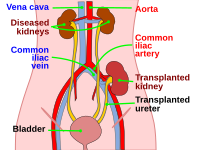
Photo from wikipedia
Background Evidence about outcomes after living kidney donation is needed both to inform donor acceptance criteria, and to guide the decisions of potential donors and their healthcare providers about donation.… Click to show full abstract
Background Evidence about outcomes after living kidney donation is needed both to inform donor acceptance criteria, and to guide the decisions of potential donors and their healthcare providers about donation. However, the scope and heterogeneity of outcomes reported in research and their relevance to decision making is uncertain. To determine the spectrum and consistency of outcomes reported in randomized trials and observational studies in living kidney donors 18 years or older. Methods Electronic databases were searched for randomized trials and observational studies reporting outcomes in adult living kidney donors published from January 2011 to May 2017. All outcome domains and measurements were extracted, and their frequency and characteristics were evaluated. Results Of the 268 eligible studies, 14 (5%) were randomized and 254 (95%) observational. Overall, 136 (51%) studies were short-term (⩽1 year follow up) and reported 109 outcome domains, of which 51 (47%) were classified as clinical, 35 (32%) were surrogate, and 23 (21%) were donor-reported. The 5 most commonly reported domains were kidney function (154, 58%), time to discharge (96, 36%), blood loss (85, 32%), operative time (79, 30%) and blood pressure (74, 28%). Quality of life (13%), mortality (16%), end-stage kidney disease (10%) and cardiovascular events (9%) were reported infrequently. Conclusions The outcomes of living kidney donation reported in contemporary trials and observational studies are numerous, heterogeneous, and often focused on short-term surgical complications. Consistent reporting of outcomes relevant to decision making is needed to better inform and prepare donors for outcomes after donation.
Journal Title: Transplantation
Year Published: 2019
Link to full text (if available)
Share on Social Media: Sign Up to like & get
recommendations!